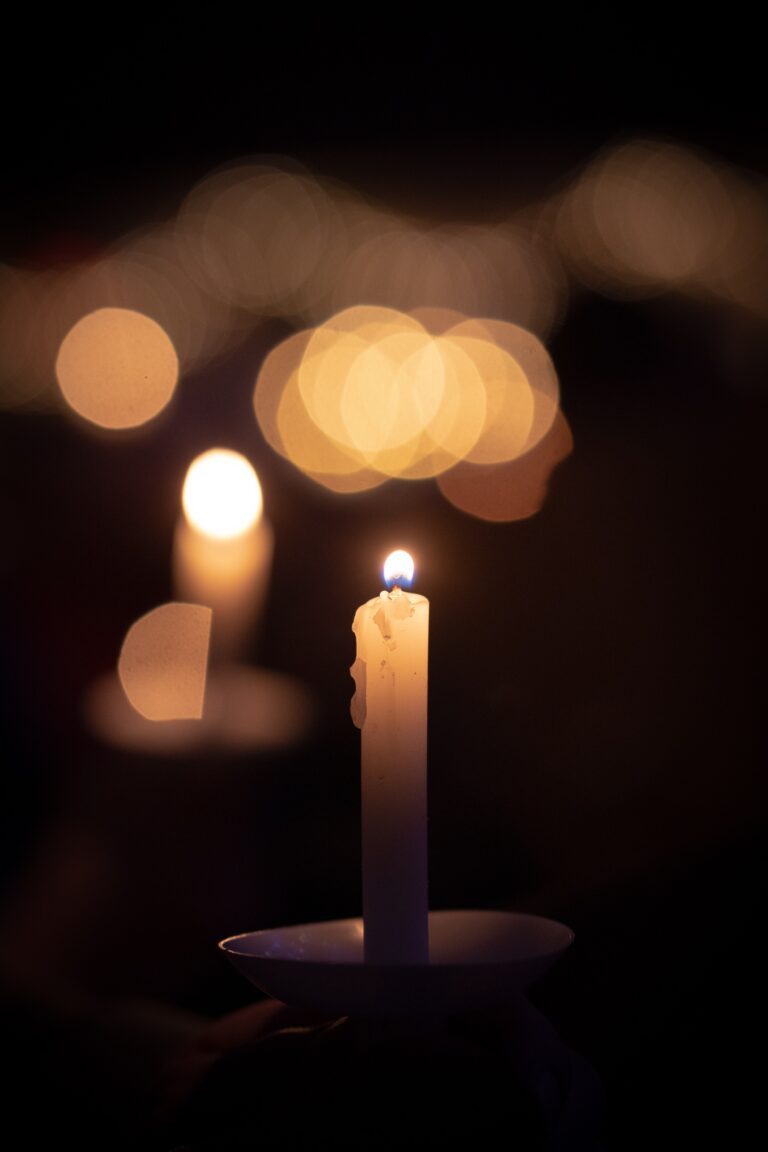Story #10 Ellen Bernstein
Story #10
Holocaust Survivor: Ellen Bernstein
Location: South Pasadena, FL
In honor of the 25th Anniversary of The Florida Holocaust Museum (The FHM), this oral history series shares the stories of twenty-five Holocaust Survivors. Each Survivor brings to the series an individual voice that enlivens our understanding of the Holocaust; the war’s effects on individuals, families, and communities dispersed across the world; and its reverberations into the present moment.
Ellen Bernstein was born in Bonn, Germany, in 1928. “I had a very wonderful childhood,” she recalls. “I had mother, father, only one grandfather living—he had lots of relatives—and one sister. She was four and a half years older than me.” Ellen shared many pleasant childhood memories of her childhood in Bonn, taking boat rides up the Rhine River, climbing mountains with her cousins, riding donkeys, and more. She and her family were very close.
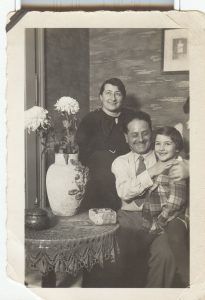 (Photo of Ellen and her parents, taken in Bonn, Germany before the war)
(Photo of Ellen and her parents, taken in Bonn, Germany before the war)When Hitler came to power in 1933, she recalled, “things slowly, without you really noticing, changed.” For instance, her mother would send her to the nearest store to buy milk or eggs, and they wouldn’t have any. “And they used to say that the chickens weren’t laying, the cows weren’t giving milk, that kind of thing, which we believed.”
Later, her sister was expelled from her public school, and the Jewish community had to hold classes in a different building. Shortly afterwards, that school was closed down as well, and the classes took place in various people’s apartments.
Ellen and her family gradually experienced more and more antisemitism. After a while her father, who was a furniture salesman, was told by a client that he could not buy from her father anymore because he was Jewish. It was this event that led the family to try to move to America.
“Something you don’t forget,” Ellen said, “when you play with kids all of the time, and all of a sudden one day you’re playing together, and the next you’re a ‘dirty Jew,’ and they throw stones at you. So, you don’t forget these things ever.”
In 1938, the family applied for visas to come to America. All were approved, except for Ellen’s grandfather. Her father, however, felt that they could not wait, so they made the difficult decision to leave without him. Fortunately, Ellen’s grandfather was able to obtain a visa several months later and rejoined the family.
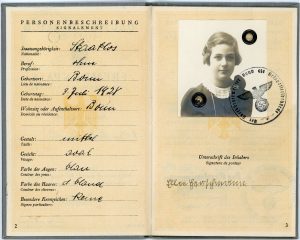 (Ellen’s passport from 1938)
(Ellen’s passport from 1938)After a tense journey through Belgium and France, Ellen and her family were able to board the Cunard Aquitania in Cherbourg. They arrived in New York on August 31, 1938, just two months before Kristallnacht, which occurred on November 9. “I remember my father calling us that morning, as we landed in New York Harbour, to the deck, getting us up early . . . as we came into the harbour and saw the Statue of Liberty. Which really, really is a very—I’m sure you’ve seen it—a fantastic thing to see, when you come like that.”
Ellen shared a particularly vivid memory of her porcelain doll. “My little doll was called Pummelchen, which means chubby. . . . And I heard the adults talking, that people were smuggling jewelry in the stomachs of the dolls that were stuffed. And I wasn’t going to let anybody open my doll, cut it open, so I held on to it. It was my security blanket, you know. . . . We get to America and we get to New York, and we go on the platform, we get off the ship, and all the relatives, all the cousins . . . were there to greet us. And I’m holding my doll, and why I don’t know, but all of a sudden the head falls off and smashes into a million pieces. . . . The relatives came with all sorts of dolls the next day, little, and big, but it wasn’t the same. It wasn’t my Pummelchen.”
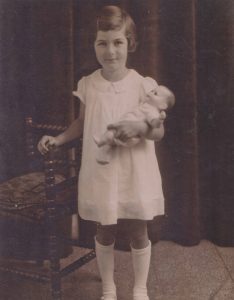 (Ellen with her doll Pummelchen)
(Ellen with her doll Pummelchen)Although their relatives helped them get settled, the family faced many obstacles upon immigration. Not knowing English made it difficult for Ellen’s father to keep a job. Her sister struggled in school, and Ellen was placed in the second grade as a 10-year-old. “It is also humiliating,” she recalled. “Here you are with the little kids, and I didn’t understand a thing. The kids were very brutal.”
After a series of short-term jobs, her father was able to start his own business. Her sister was accepted into an art school, where she excelled. As she learned English, Ellen was eventually able to catch up to her grade level. “Slowly they skipped me through the grades, until I got into my correct grade, and I went through public school, High School, Hunter College. I went to Hunter College at night, because I had to work, you know, we all had to help. My sister worked for a family and took care of their children, and everybody had to pitch in. So that’s the early years of my life.”
Ellen eventually married and moved to Scranton, Pennsylvania. After her first husband died of cancer at the age of 40, she remarried. She has three grandsons and a granddaughter, and now eight great-grandchildren.
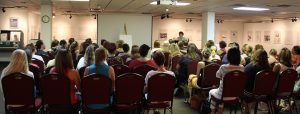 (Ellen speaking at the Summer Institute for Teachers at The FHM in 2016)
(Ellen speaking at the Summer Institute for Teachers at The FHM in 2016)Currently Ellen lives in Florida and volunteers frequently at The Florida Holocaust Museum. “I do a lot of volunteering at the Museum, and I speak to the kids, and I work in the office, and I used to run the gift shop, and things like that.” The Museum displays her passport and an autograph book she had kept from her childhood in Bonn. “My girlfriend gave it to me before I left. My school friends, my relatives, everybody wrote in there. And unfortunately, most of the people are gone.”
Story by: Rachel Saltzgiver, Samuel Seader, and Katya Galfund
Edited by: Jared Stark and Kristen Wright

